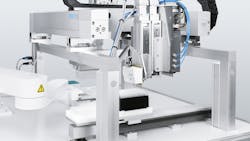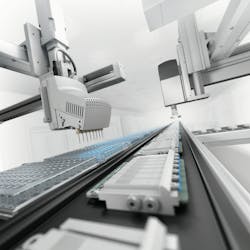Automation Uptake in Life Sciences Brings Market Opportunities
Life sciences, a branch of science concerned with the study of life, is one of the many industries looking to employ automation to help make operations more productive and consistent.
In the early 2000s, Festo Corp. saw growing market adoption of automation in the life sciences sector. Because of the company’s strong background in industrial automation, it decided to bring its expertise to the life sciences market, which is now Festo’s fastest growing customer segment, said Joshua Lamontagne, Product Market Manager, LifeTech, Festo.
This industry segment includes:
- Laboratory Automation and Diagnostics
- Biotech, Pharma and Cosmetics
- Medical Technology.
“We develop automation portfolios for each of these industries, and what we do is try to take what we learn from one industry and apply it in a parallel market,” said Lamontagne. “Specifically, within laboratory automation and diagnostics, we've developed automation in this area that's really focusing on miniaturization; we can take this miniaturization and apply it back to other industry segments now. What we develop for one industry segment hopefully has crossover within other more traditional industry segments.”
What is Driving Growth for Automation in Life Sciences?
Life sciences is a growing customer segment for Festo due in part to an aging global population. People are living longer, requiring more medical care. In addition, the global population continues to rise, leading to a higher presence of illnesses and the need for healthcare solutions.
All of this requires more testing and throughput of testing processes, development of medical technologies, and production of pharmaceuticals, necessitating the use of automation to keep up with demand.
Lamontagne explained that many processes in laboratories, for example, are still very manual. Lab technicians will physically remove a cap from a vial, add a reagent, place the cap back on the vial and move it down the bench to the next station which he said is not very feasible if you need to scale this process.
Because many laboratory processes work like a production line, Festo is able to bring its expertise automating similar setups in other applications to these laboratory processes. Doing so not only minimizes the need for manual work but can also help to ensure consistency.
Automating a process enables it to be completed in the same manner each and every time, reducing rework which can help to speed up operations. Consistently performing the same task also helps to maintain quality, a critical aspect when dealing with human health.
The benefits offered by automation help to keep costs down as well, another factor driving its uptake. Those working in the life sciences industry do not want the cost to increase in proportion with the number of tests or other processes they are undertaking, said Lamontagne. By employing automation, more work can be done while keeping additional costs to a minimum.
Global Engineering Centers Ensure Automation Tech Meets Market and Regional Needs
The Festo LifeTech Division offers a range of pneumatic and electric solutions specifically for life sciences applications which are developed at its technical engineering centers located in various parts of the world:
- Boston, MA
- Esslingen, Germany
- Sofia, Bulgaria
- Shanghai, China.
Read the article "Festo Brings Automation Expertise to Life Sciences Industry" to learn about some of the pneumatic and electric automation technologies Festo has developed for laboratory automation and other life sciences applications.
“By having these technical engineering centers around the world, we're able to quickly develop products that meet market needs because we're close to the market, and we meet specific regional needs as well,” said Lamontagne. “What might work well in the U.S. life sciences market may not necessarily work well in China, so we're able to develop products specifically for the regional market.”
He said that each engineering center offers dedicated application support. Feasibility testing and fast prototyping are among the capabilities offered as well as designing specific full system solutions for customers. Festo is also able to benchmark its valves and other products at these facilities to ensure they will meet customer requirements.
Knowledge gained at one engineering center is shared globally with customers and the other engineering centers to help ensure optimal product development and education across the life sciences industry.
About the Author
Sara Jensen
Executive Editor, Power & Motion
Sara Jensen is executive editor of Power & Motion, directing expanded coverage into the modern fluid power space, as well as mechatronic and smart technologies. She has over 15 years of publishing experience. Prior to Power & Motion she spent 11 years with a trade publication for engineers of heavy-duty equipment, the last 3 of which were as the editor and brand lead. Over the course of her time in the B2B industry, Sara has gained an extensive knowledge of various heavy-duty equipment industries — including construction, agriculture, mining and on-road trucks —along with the systems and market trends which impact them such as fluid power and electronic motion control technologies.
You can follow Sara and Power & Motion via the following social media handles:
X (formerly Twitter): @TechnlgyEditor and @PowerMotionTech
LinkedIn: @SaraJensen and @Power&Motion
Facebook: @PowerMotionTech



